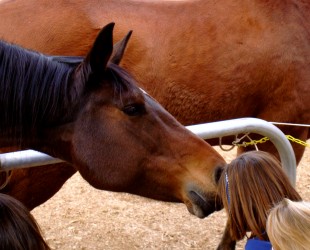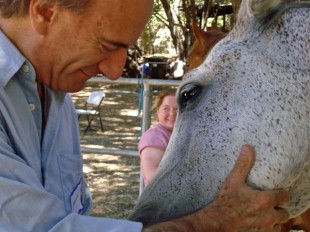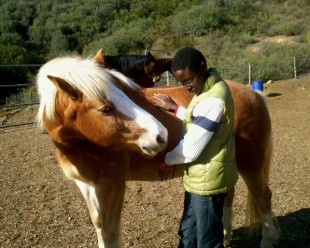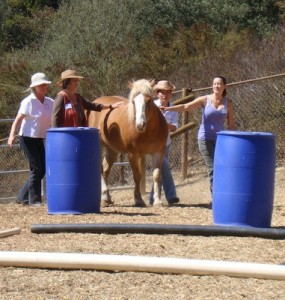Horses are amazingly resilient and very forgiving. Watch a herd for any period of time and you’ll see that just like any other social group they have their share of skirmishes and disagreements, yet they quickly let it go, re-connect as a herd, and move on with the business at hand.
 In contrast, for us humans, letting go and moving forward can be extremely challenging. Whether we have experienced a bruised ego or a serious physical or emotional violation, learning how to let go of resentment and anger is essential for our physical and emotional well-being.
In contrast, for us humans, letting go and moving forward can be extremely challenging. Whether we have experienced a bruised ego or a serious physical or emotional violation, learning how to let go of resentment and anger is essential for our physical and emotional well-being.
Virtually everyone has experienced being hurt by the words or actions of another. Maybe you were bullied at school, had a colleague sabotage a work project, or your spouse betrayed you. When we have been hurt – either physically or emotionally – it is very easy to get stuck in fantasies of revenge or bury ourselves in resentment. While such responses give us the illusion of power, they ultimately rob us of the peace and vitality we need to move forward in life. Letting go of past hurts is a powerful remedy – studies¹ have shown that forgiveness can lead to:
- Lower Blood Pressure & Heart Rate
- Less Anxiety & Stress
- Stronger Immune System
- Less Depression
- Reduced Anger and Hostility
- Healthier Relationships
- Greater Self-Confidence
- Lower Risk of Alcohol & Substance Abuse
“Not to forgive is like drinking poison and waiting for your enemies to die” Nelson Mandela
So, what is forgiveness?
Forgiveness is not about forgetting, it is an internal process of accepting, grieving, and letting go. We have to accept the reality of what happened, grieve all that was lost as a result of being wronged, and move forward in life. Often it means coming to terms with the reality of who someone is – for instance, “My mother is not going to change and I need to let go of wanting her be someone she isn’t.” Really, forgiveness is about changing the story of our future.
Horses are amazing teachers about accepting reality, staying in the present moment, and moving forward.
 Mark* came to Stand InBalance after a painful divorce that left him bitter, lonely, and lost. He was immediately drawn to a horse that he thought would be “easy” to work with. As the session unfolded, Mark found himself struggling to get the horse to like him and partner with him in the activities. As Mark became more frustrated and resentful he realized that the horse reminded him of “Nancy,” his ex-wife. The more frustrated he became the more difficult the interaction. After 30 minutes, Mark and “Nancy” found a nice, cooperative, rhythm together. However, this was quickly undone as “Nancy” started pulling him off course toward another horse in the arena. Mark’s irritation began to mount. Finally, Mark decided to “let go.” This was a huge turning point for him. His whole energy shifted as he released the power struggle he had been in – not only with Nancy, but with his own ego. Mark’s entire body softened and he was visibly calmer. As we processed the session, Mark remarked that hanging onto the horse was like hanging on to his ex-wife and all this anger and resentment he had been storing up about how she unilaterally ended the marriage. He realized that letting go wasn’t about losing – it was about freeing himself.
Mark* came to Stand InBalance after a painful divorce that left him bitter, lonely, and lost. He was immediately drawn to a horse that he thought would be “easy” to work with. As the session unfolded, Mark found himself struggling to get the horse to like him and partner with him in the activities. As Mark became more frustrated and resentful he realized that the horse reminded him of “Nancy,” his ex-wife. The more frustrated he became the more difficult the interaction. After 30 minutes, Mark and “Nancy” found a nice, cooperative, rhythm together. However, this was quickly undone as “Nancy” started pulling him off course toward another horse in the arena. Mark’s irritation began to mount. Finally, Mark decided to “let go.” This was a huge turning point for him. His whole energy shifted as he released the power struggle he had been in – not only with Nancy, but with his own ego. Mark’s entire body softened and he was visibly calmer. As we processed the session, Mark remarked that hanging onto the horse was like hanging on to his ex-wife and all this anger and resentment he had been storing up about how she unilaterally ended the marriage. He realized that letting go wasn’t about losing – it was about freeing himself.
“To forgive is to set a prisoner free and discover the prisoner was you.”²
According to Dr. Fred Luskin, an expert on forgiveness and the director of the Stanford University Forgiveness Projects, the main components of forgiveness – grieving and letting go – are simple, but the execution is hard. His book, Forgive for Good, offers a proven nine-step forgiveness method that makes it possible to move beyond being a victim to a life of improved health and contentment. Here are the main tenants³:
- Know exactly how you feel about what happened and be able to articulate what about the situation is not OK. Then, tell a trusted couple of people about your experience.
- Make a commitment to yourself to do what you have to do to feel better. Forgiveness is for you and not for anyone else.
- Forgiveness does not necessarily mean reconciliation with the person that hurt you, or condoning of their action. What you are after is to find peace. Forgiveness can be defined as the “peace and understanding that come from blaming that which has hurt you less, taking the life experience less personally, and changing your grievance story.”
- Get the right perspective on what is happening. Recognize that your primary distress is coming from the hurt feelings, thoughts and physical upset you are suffering now, not what offended you or hurt you two minutes – or ten years – ago. Forgiveness helps to heal those hurt feelings.
- At the moment you feel upset practice a simple stress management technique to soothe your body’s flight or fight response.
- Give up expecting things from other people, or your life, that they do not choose to give you. Recognize the “unenforceable rules” you have for your health or how you or other people must behave. Remind yourself that you can hope for health, love, peace and prosperity and work hard to get them.
- Put your energy into looking for another way to get your positive goals met than through the experience that has hurt you. Instead of mentally replaying your hurt seek out new ways to get what you want.
- Remember that a life well lived is your best revenge. Instead of focusing on your wounded feelings, and thereby giving the person who caused you pain power over you, learn to look for the love, beauty and kindness around you. Forgiveness is about personal power.
- Amend your grievance story to remind you of the heroic choice to forgive.
Other resources include:
Forgiveness is a Choice: A step-by-step process for resolving anger and restoring hope by Robert D. Enright, PhD
Four Elements of Forgiveness – article by Ryan Howes, PhD
References:
[1] http://www.mayoclinic.com/health/forgiveness/MH00131
http://learningtoforgive.com/about/
Luskin, Frederic. “The Stanford Forgiveness Projects.” Research Report from Forgiveness: A Sampling of Research Results, compiled by the American Psychological Association on the occasion of the 59th Annual DPI/NGO Conference at the United Nations Headquarters Midday Workshop on Forgiveness: Partnering with the Enemy, September 2006.
[2] Smedes, L., Forgive and Forget, 1984
[3] http://learningtoforgive.com/9-steps/
* All names and identifying information have been changed.



 In contrast, for us humans, letting go and moving forward can be extremely challenging. Whether we have experienced a bruised ego or a serious physical or emotional violation, learning how to let go of resentment and anger is essential for our physical and emotional well-being.
In contrast, for us humans, letting go and moving forward can be extremely challenging. Whether we have experienced a bruised ego or a serious physical or emotional violation, learning how to let go of resentment and anger is essential for our physical and emotional well-being. Mark* came to Stand InBalance after a painful divorce that left him bitter, lonely, and lost. He was immediately drawn to a horse that he thought would be “easy” to work with. As the session unfolded, Mark found himself struggling to get the horse to like him and partner with him in the activities. As Mark became more frustrated and resentful he realized that the horse reminded him of “Nancy,” his ex-wife. The more frustrated he became the more difficult the interaction. After 30 minutes, Mark and “Nancy” found a nice, cooperative, rhythm together. However, this was quickly undone as “Nancy” started pulling him off course toward another horse in the arena. Mark’s irritation began to mount. Finally, Mark decided to “let go.” This was a huge turning point for him. His whole energy shifted as he released the power struggle he had been in – not only with Nancy, but with his own ego. Mark’s entire body softened and he was visibly calmer. As we processed the session, Mark remarked that hanging onto the horse was like hanging on to his ex-wife and all this anger and resentment he had been storing up about how she unilaterally ended the marriage. He realized that letting go wasn’t about losing – it was about freeing himself.
Mark* came to Stand InBalance after a painful divorce that left him bitter, lonely, and lost. He was immediately drawn to a horse that he thought would be “easy” to work with. As the session unfolded, Mark found himself struggling to get the horse to like him and partner with him in the activities. As Mark became more frustrated and resentful he realized that the horse reminded him of “Nancy,” his ex-wife. The more frustrated he became the more difficult the interaction. After 30 minutes, Mark and “Nancy” found a nice, cooperative, rhythm together. However, this was quickly undone as “Nancy” started pulling him off course toward another horse in the arena. Mark’s irritation began to mount. Finally, Mark decided to “let go.” This was a huge turning point for him. His whole energy shifted as he released the power struggle he had been in – not only with Nancy, but with his own ego. Mark’s entire body softened and he was visibly calmer. As we processed the session, Mark remarked that hanging onto the horse was like hanging on to his ex-wife and all this anger and resentment he had been storing up about how she unilaterally ended the marriage. He realized that letting go wasn’t about losing – it was about freeing himself.